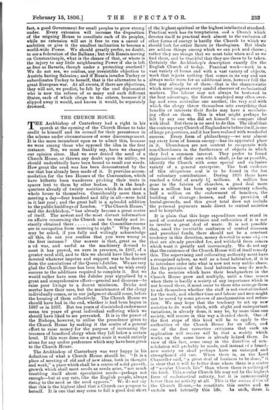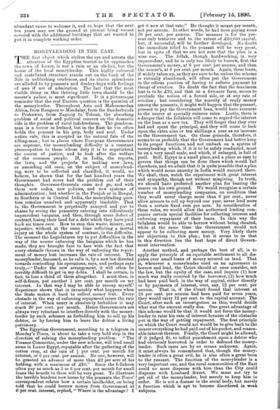THE CHURCH HOUSE.
THE Archbishop of Canterbury had a right in his speech at the opening of the Church House to take credit to himself and its council for their persistence in the scheme under circumstances of some discouragement. It is the more incumbent upon us to admit this, because we were among those who opposed the idea in the first instance. Nor, we must frankly say, have we changed our opinion since. Had we ever denied the need of a Church House, or thrown any doubt upon its utility, we should undoubtedly have been bound to recall our words. How great the need was has been demonstrated by the use that has already been made of it. It provides accom- modation for the two Houses of the Convocation, which have hitherto been wanderers pitching their tents in spaces lent to them by other bodies. It is the head- quarters already of twenty societies which do not need a whole house to themselves. Considerably more than a meeting a day—four hundred and fifty in all—were held in it last year; and the great hall is a splendid addition to the public buildings of London. " The Church House," said the Archbishop, " has already become a great centre of itself. The newest and the most distant information on affairs concerning the Church can be readily and in-
stantly obtained there and the Committee-rooms are in occupation from morning to night." Why then, it way be asked, if you fully and willingly acknowledge all this, do not you confess that you were wrong in the first instance ? Our answer is that, great as the n .ed was, and useful as the machinery devised to meet it has proved, we were in presence, in 1887, of a greater need still, and to this we should have liked to see devoted whatever impetus and support was to be derived from the associations of the Queen's Jubilee. We are very glad the Church House has been built, and we wish every success to the additions required to complete it. But we would rather have seen the Jubilee year signalised by a great and comprehensive effort—general and diocesan—to raise poor livings to a decent minimum. Bricks and mortar have their uses, but the maintenance of the clergy individually comes, or in our judgment should come, before the housing of them collectively. The Church House we should have had in the end, whether it had been begun in 1887 or in 1897. But ten years of diminished endowment mean ten years of great individual suffering which we should have liked to see prevented. It is in the power of the Bishops, however, to utilise the precedence given to the Church House by making it the centre of a general effort to raise money for the purpose of increasing the incomes of beneficed clergy when they fall below a certain level. If this were done on a great scale it would entirely atone for any undue preference which may have been given to the Church House.
The Archbishop of Canterbury was very happy in his definition of what a Church House should be. " It is a place of meeting of old and of new ideas, both in thought and work," a place which shall be a centre of solid growth, growth which shall meet needs as needs arise, "not much troubling itself about speculative needs—perhaps not enough—but at any rate, like the English people, always rising to the need as the need appears." We do not say that this is the highest ideal that a Church can propose to herself. It is one that may seem to fall a good deal short
of the highest spiritual or the highest intellectual standard. Practical work has its temptations, and a Church which devotes itself to practical work almost to the exclusion of other forms of energy is hardly the Church to which we should look for either Saints or theologians. But ideals are seldom things among which we can pick and choose ; rather they are things that we must take when and as we had them, and be thankful that they are there to be taken. Certainly the Archbishop's description exactly fits the English Church of to-day. Practical work—work in a vast variety of forms and with a vast variety of objects, work that rejects nothing that comes in its way and can always make room for an additional iron, however full the fire may already be of them—that is the characteristic which must impress every candid observer of ecclesiastical matters. The labour may not always be bestowed to the best advantage, the forces employed may often over. lap and even neutralise one another, the vet), zeal with which the clergy throw themselves into everything that benefits or interests their flocks may have a secularis- ing effect on them. This is what might perhaps be felt by any one who did set himself to compare ideal with ideal. But there is no need to do this. The ideal that the contemporary Church of England sets before itself, is one of huge proportions, and it has been realised with wonderful success. Every form of philanthropy—we may almost say every form of human energy—has its appointed place in it. Churchmen are not content to co-operate with non-Churchmen in the furtherance of objects in which they feel a common interest. They prefer to found organisations of their own which shall, as far as possible, identify the Church with some special and exclusive variety of a general enterprise. The best evidence of this ubiquitous zeal is to be found in the list of voluntary contributions. During 1895 these have reached a total of nearly 5 millions. A million has gone to the fabrics of churches, a good deal more than a million has been spent on elementary schools, half a. million on the endowment of benefices, the building of vicarage - houses, and the provision of burial-grounds, and this great total does not include the personal payments made direct to central societies and to hospitals.
It is plain that this huge expenditure must stand in need of constant supervision and collocation if it is not to involve a great deal of waste. It is not possible that, amid the inevitable confusion of central diocesan and parochial funds, there should not be a constant tendency in this direction, money devoted to some objects that are already provided for, and withheld from others which want it greatly and increasingly. We do not say that the existence of the Church House will of itself remedy this. The supervising and collocating authority must have a recognised sphere, as well as a local habitation, if it is to introduce order into what is now not very unlike chaos. But the provision of the local habitation may do much. As the societies which have their headquarters in the Church House grow and multiply, until a time comes when there is hardly a society of any importance which is not housed there, it must occur to those who manage them to ask themselves whether the staff is not over-abundant for the work, and whether time and labour and men might not be saved by some process of amalgamation and reduc- tion. We may hope that the tendency to set up new societies to do work which, with slight and unimportant variations, is already done, it may be, by more than one society, will receive in this way a decided check. One of the first steps of this kind will be to apply to the authorities of the Church House for an office, and one of the first corrective criticisms that such an application will receive will be that a society which works on the same lines is already lodged there. In view of this fact, some essay in the direction of con- solidation will probably be made, and instead of a brand- new society we shall perhaps have an enlarged and strengthened old one. When there is, as the Lord Chanceller said, " a great deal of business to be done," it is clear that it will be better done where there is a antra of "secular Church life" than where there is nothing of the kind. This secular Church life may not be the highest form of ecclesiastical activity, but it is immeasurably better than no activity at all. This is the raison. cl'W1re of the Church llouse,—to constitute this centre and so sustain and iutensify this life. such, there . is abundant cause to welcome it, and to hope that the next ten years may see the ground at present lying vacant covered with the additional buildings that are wanted to put it in complete working order.



































 Previous page
Previous page